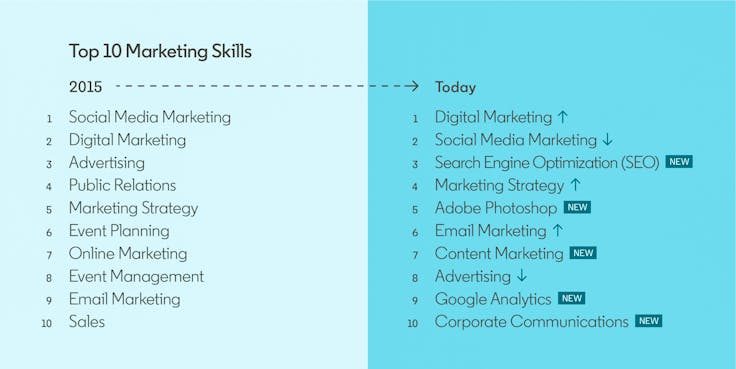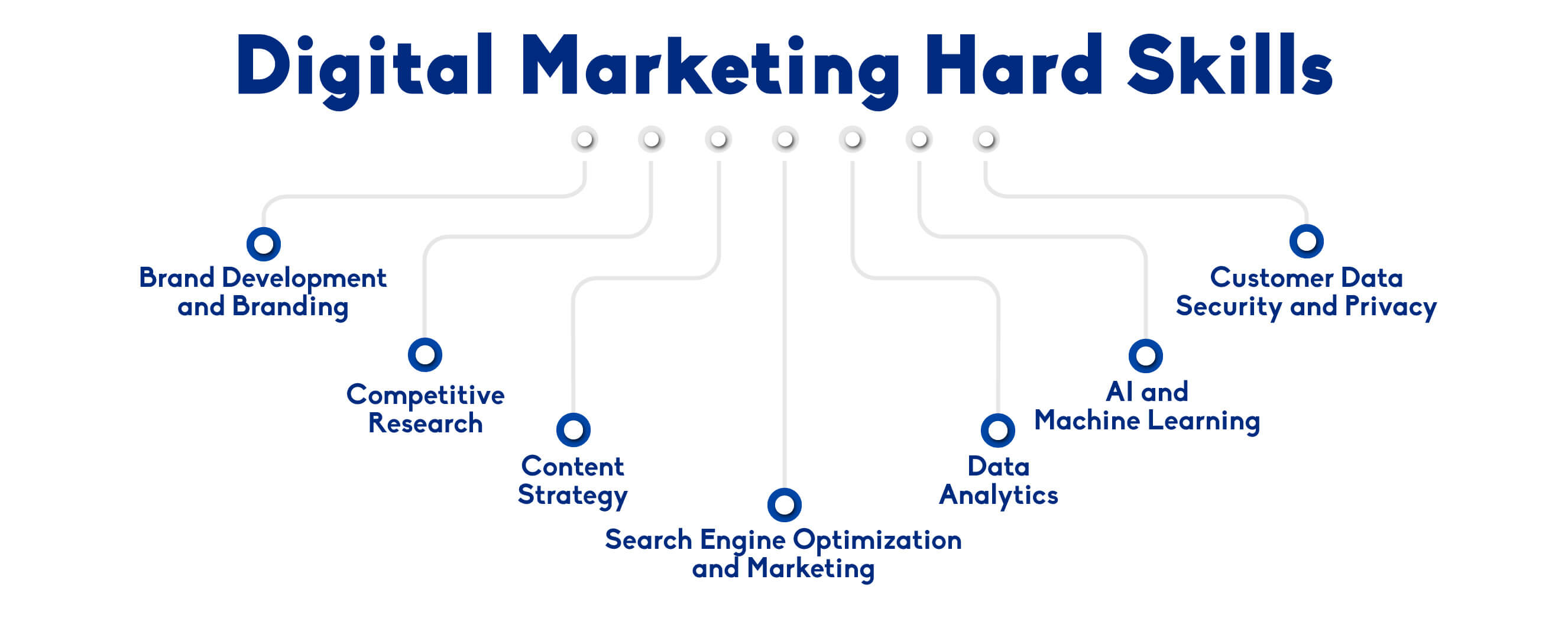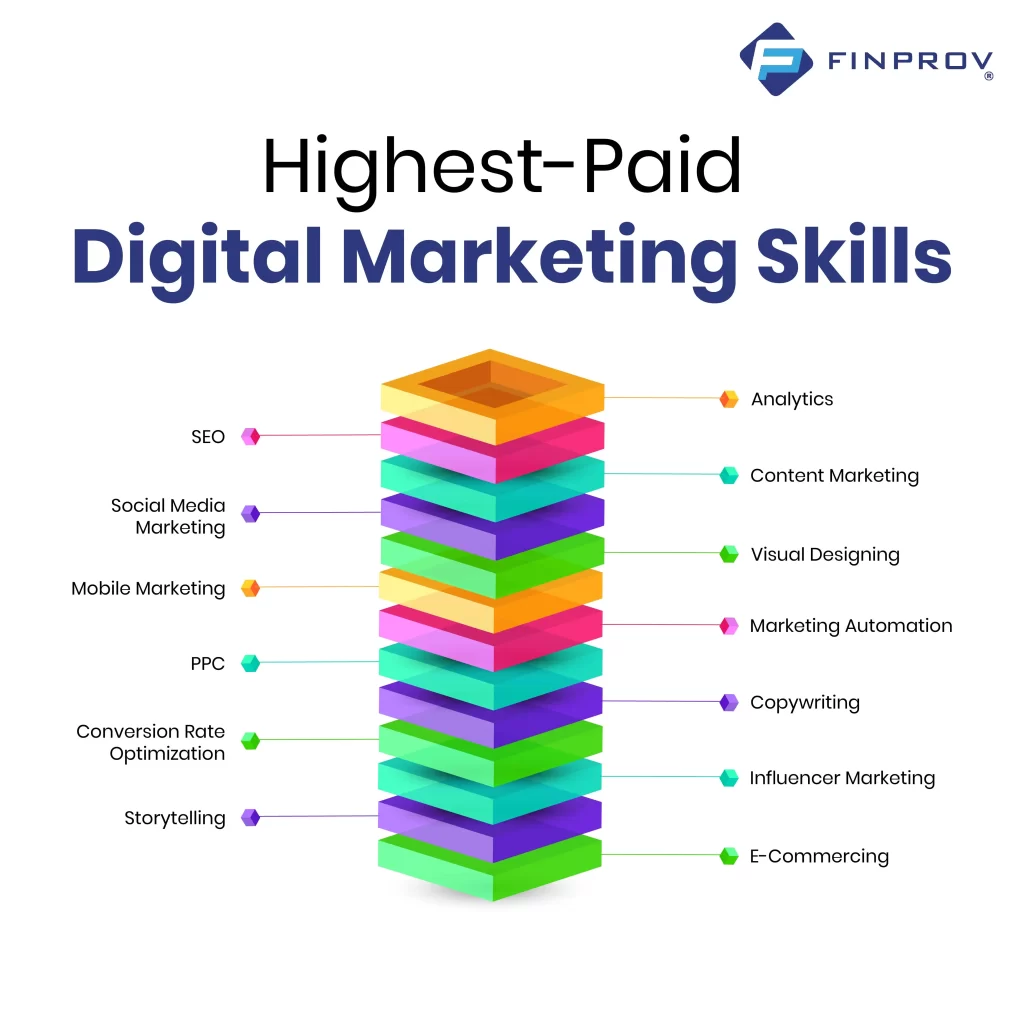- What's the Most Wanted Digital Marketing Skills?
-
Which is the most demanding skill in digital marketing?
- Why is Data Analysis the Most Demanding Skill in Digital Marketing?
- How Does SEO Expertise Impact Digital Marketing Success?
- Why is Content Creation a Vital Skill in Digital Marketing?
- How Does Social Media Management Influence Digital Marketing?
- Why is Paid Advertising Expertise Important in Digital Marketing?
- What skills are good for digital marketing?
- What is the highest paying digital skill?
- What are the 5 A's of digital marketing?
- Frequently Asked Questions (FAQ)
In today’s fast-paced digital landscape, businesses are constantly evolving to meet the demands of an increasingly online world. As a result, the need for skilled digital marketers has never been greater. Companies are seeking professionals who can navigate the complexities of online platforms, analyze data effectively, and craft strategies that drive engagement and growth. From mastering search engine optimization (SEO) to leveraging social media trends, the most sought-after digital marketing skills combine creativity, technical expertise, and adaptability. This article explores the top digital marketing skills that are in high demand, offering insights into how professionals can stay ahead in this competitive and ever-changing field.
What's the Most Wanted Digital Marketing Skills?
Digital marketing is a dynamic field that requires a diverse set of skills to stay competitive. As businesses increasingly rely on digital channels to reach their audiences, professionals in this field must continuously adapt and enhance their expertise. Below, we explore the most sought-after digital marketing skills that can help you stand out in the industry.
See Also What's the Most Wanted Digital Marketing Skills?
What's the Most Wanted Digital Marketing Skills?1. Search Engine Optimization (SEO)
SEO remains one of the most critical skills in digital marketing. It involves optimizing websites to rank higher on search engine results pages (SERPs), driving organic traffic. Key components include keyword research, on-page optimization, technical SEO, and link building. Mastering SEO ensures that your content is discoverable and reaches the right audience.
| SEO Skill | Description |
|---|---|
| Keyword Research | Identifying the terms your audience is searching for. |
| On-Page Optimization | Optimizing individual web pages for better rankings. |
| Technical SEO | Improving website infrastructure for search engines. |
| Link Building | Acquiring backlinks to boost domain authority. |
2. Data Analytics and Interpretation
Data-driven decision-making is at the core of successful digital marketing campaigns. Professionals must be proficient in tools like Google Analytics, Google Data Studio, and Tableau to track performance metrics, analyze user behavior, and measure ROI. Understanding data allows marketers to refine strategies and allocate resources effectively.
See Also Which Project Management Software do you prefer?
Which Project Management Software do you prefer?| Analytics Tool | Purpose |
|---|---|
| Google Analytics | Track website traffic and user behavior. |
| Google Data Studio | Create interactive dashboards and reports. |
| Tableau | Visualize complex data for better insights. |
3. Content Marketing and Creation
Content is king in digital marketing. The ability to create engaging, valuable, and SEO-friendly content is essential. This includes blog posts, videos, infographics, and social media updates. Additionally, understanding content strategy and content distribution ensures that your content reaches the right audience at the right time.
| Content Type | Purpose |
|---|---|
| Blog Posts | Educate and engage your audience. |
| Videos | Increase engagement and explain complex topics. |
| Infographics | Present data in a visually appealing way. |
Social media platforms are powerful tools for building brand awareness and engaging with audiences. Skills in platform-specific strategies, community management, and paid social advertising are highly valued. Staying updated with algorithm changes and trends is crucial for success.
See AlsoMy Step-by-Step Guide for a Competitor Analysis| Platform | Key Focus |
|---|---|
| Targeted ads and community building. | |
| Visual storytelling and influencer partnerships. | |
| B2B marketing and professional networking. |
5. Paid Advertising (PPC)
Pay-per-click (PPC) advertising is a highly effective way to drive targeted traffic. Skills in managing campaigns on platforms like Google Ads, Microsoft Advertising, and social media ads are in demand. Understanding bid management, ad copywriting, and conversion rate optimization is essential for maximizing ROI.
| PPC Platform | Key Feature |
|---|---|
| Google Ads | Search and display network advertising. |
| Microsoft Advertising | Reach Bing and Yahoo audiences. |
| Social Media Ads | Target specific demographics and interests. |
Which is the most demanding skill in digital marketing?

Why is Data Analysis the Most Demanding Skill in Digital Marketing?
Data analysis is considered the most demanding skill in digital marketing because it enables marketers to make informed decisions based on data-driven insights. With the rise of big data, businesses rely on analyzing customer behavior, campaign performance, and market trends to optimize strategies. Key reasons include:
- Improved targeting: Data analysis helps identify the right audience segments for personalized campaigns.
- Performance tracking: Marketers can measure the effectiveness of campaigns in real-time and adjust strategies accordingly.
- ROI optimization: By analyzing data, marketers can allocate budgets more efficiently to maximize returns.
How Does SEO Expertise Impact Digital Marketing Success?
SEO (Search Engine Optimization) expertise is crucial in digital marketing as it ensures that websites rank higher on search engines, driving organic traffic. Key aspects include:
- Keyword research: Identifying the right keywords to target for better visibility.
- On-page optimization: Enhancing website content, meta tags, and structure for search engines.
- Technical SEO: Improving site speed, mobile-friendliness, and indexing for better rankings.
Why is Content Creation a Vital Skill in Digital Marketing?
Content creation is essential because it drives engagement, builds brand authority, and supports other marketing efforts. Key reasons include:
- Audience engagement: High-quality content attracts and retains customers.
- SEO benefits: Content optimized for search engines improves organic rankings.
- Brand storytelling: Compelling content helps convey a brand’s message and values effectively.
Social media management is a critical skill as it helps brands connect with their audience and build relationships. Key aspects include:
- Community engagement: Interacting with followers to foster loyalty and trust.
- Content distribution: Sharing content across platforms to increase reach and visibility.
- Analytics tracking: Monitoring performance metrics to refine strategies and improve results.
Why is Paid Advertising Expertise Important in Digital Marketing?
Paid advertising expertise is vital because it allows marketers to reach targeted audiences quickly and effectively. Key reasons include:
- Immediate results: Paid campaigns generate traffic and leads faster than organic methods.
- Precise targeting: Platforms like Google Ads and Facebook Ads offer advanced targeting options.
- Scalability: Paid campaigns can be scaled up or down based on budget and goals.
What skills are good for digital marketing?

Content Creation and Copywriting
Content creation and copywriting are essential skills in digital marketing. These skills involve crafting compelling and engaging content that resonates with the target audience. Effective content can drive traffic, generate leads, and increase conversions. Key aspects include:
- Writing persuasive copy that captures attention and encourages action.
- Creating SEO-optimized content to improve search engine rankings.
- Developing visual content such as infographics, videos, and images to enhance engagement.
Search Engine Optimization (SEO)
SEO is a critical skill for digital marketers, as it helps improve a website's visibility on search engines. This involves optimizing content and website structure to rank higher in search results. Important elements include:
- Conducting keyword research to identify relevant search terms.
- Optimizing on-page elements like meta tags, headers, and URLs.
- Building high-quality backlinks to improve domain authority.
Data Analysis and Analytics
Data analysis is crucial for measuring the effectiveness of digital marketing campaigns. Marketers need to interpret data to make informed decisions and optimize strategies. Key components include:
- Using tools like Google Analytics to track website performance.
- Analyzing campaign metrics such as click-through rates and conversion rates.
- Creating data-driven reports to guide future marketing efforts.
Social media marketing involves promoting products or services on platforms like Facebook, Instagram, and LinkedIn. This skill requires understanding platform algorithms and audience behavior. Key practices include:
- Developing content calendars to maintain consistent posting schedules.
- Engaging with followers through comments, messages, and polls.
- Running paid social media campaigns to reach a broader audience.
Email Marketing
Email marketing remains a powerful tool for nurturing leads and maintaining customer relationships. This skill involves creating targeted email campaigns that drive engagement. Key strategies include:
- Segmenting email lists to deliver personalized content.
- Designing responsive email templates for optimal viewing on all devices.
- Monitoring email performance metrics like open rates and click-through rates.
What is the highest paying digital skill?

What is the Highest Paying Digital Skill?
The highest paying digital skill currently is Artificial Intelligence (AI) and Machine Learning (ML). Professionals with expertise in AI and ML are in high demand across industries such as healthcare, finance, and technology. These skills involve developing algorithms, creating predictive models, and automating complex processes, which are critical for businesses aiming to leverage data-driven decision-making.
Why is AI and Machine Learning So Lucrative?
AI and Machine Learning are lucrative because they solve complex problems and drive innovation. Companies are willing to pay top dollar for professionals who can:
- Develop advanced algorithms to improve efficiency and accuracy.
- Create predictive models that help businesses forecast trends and make informed decisions.
- Automate repetitive tasks, saving time and reducing operational costs.
What Industries Pay the Most for AI and ML Skills?
Industries that heavily invest in AI and ML include:
- Technology: Companies like Google, Amazon, and Microsoft rely on AI for product development and innovation.
- Finance: Banks and financial institutions use AI for fraud detection, risk assessment, and trading algorithms.
- Healthcare: AI is used for diagnostics, personalized medicine, and drug discovery.
What Are the Key Skills Needed for AI and ML?
To excel in AI and ML, professionals need a combination of technical and analytical skills, including:
- Programming languages like Python, R, and Java.
- Data analysis and visualization tools such as TensorFlow and Tableau.
- Mathematical expertise in areas like linear algebra, calculus, and statistics.
How Can You Learn AI and Machine Learning?
There are several ways to acquire AI and ML skills, such as:
- Online courses from platforms like Coursera, edX, and Udemy.
- Certifications from recognized institutions like Google, IBM, and Microsoft.
- Hands-on projects and internships to gain practical experience.
What are the 5 A's of digital marketing?
What are the 5 A's of Digital Marketing?
The 5 A's of digital marketing are a framework designed to help businesses understand and optimize the customer journey in the digital age. This model focuses on five key stages: Awareness, Appeal, Ask, Act, and Advocate. Each stage represents a critical touchpoint where businesses can engage with their audience and drive meaningful interactions.
1. Awareness: Building Visibility
The first stage, Awareness, is about making potential customers aware of your brand, product, or service. This involves creating visibility through various digital channels such as social media, search engines, and content marketing. Key strategies include:
- Utilizing SEO to rank higher in search engine results.
- Running targeted social media campaigns to reach your audience.
- Creating engaging content like blogs, videos, and infographics to attract attention.
2. Appeal: Capturing Interest
Once awareness is established, the next step is Appeal, which focuses on capturing the interest of your audience. This stage is about creating a compelling value proposition and ensuring your brand stands out. Effective tactics include:
- Designing visually appealing landing pages and ads.
- Highlighting unique selling points (USPs) to differentiate your brand.
- Using storytelling to connect emotionally with your audience.
3. Ask: Encouraging Interaction
The Ask stage involves encouraging potential customers to interact with your brand. This could mean signing up for a newsletter, filling out a form, or engaging with your content. Strategies to boost interaction include:
- Adding clear calls-to-action (CTAs) on your website and ads.
- Offering incentives like discounts or free trials to encourage engagement.
- Using chatbots or live chat to answer questions and guide users.
4. Act: Driving Conversions
In the Act stage, the goal is to convert interested users into paying customers. This requires optimizing the user experience and removing any barriers to purchase. Key actions include:
- Streamlining the checkout process to reduce friction.
- Offering multiple payment options to cater to different preferences.
- Providing clear product information and reviews to build trust.
5. Advocate: Fostering Loyalty
The final stage, Advocate, focuses on turning satisfied customers into brand advocates. This involves encouraging them to share their positive experiences and recommend your brand to others. Effective methods include:
- Implementing referral programs to reward loyal customers.
- Encouraging user-generated content like reviews and testimonials.
- Engaging with customers on social media to build long-term relationships.
Frequently Asked Questions (FAQ)
What are the most in-demand digital marketing skills in 2023?
In 2023, the most sought-after digital marketing skills include data analytics, SEO (Search Engine Optimization), content marketing, and social media strategy. Businesses are increasingly relying on data-driven decisions, making data analytics a critical skill for understanding customer behavior and campaign performance. Additionally, SEO expertise remains essential for improving organic search rankings, while content marketing is vital for engaging audiences and building brand authority. Lastly, social media strategy is crucial for leveraging platforms like Instagram, TikTok, and LinkedIn to reach target audiences effectively.
Why is SEO considered a top digital marketing skill?
SEO (Search Engine Optimization) is considered a top digital marketing skill because it directly impacts a brand's online visibility and organic traffic. With millions of websites competing for attention, mastering keyword research, on-page optimization, and technical SEO ensures that a website ranks higher on search engines like Google. This skill is particularly valuable as it provides long-term results without the need for continuous ad spending, making it a cost-effective strategy for businesses.
How important is content marketing in digital marketing?
Content marketing is one of the most important skills in digital marketing because it drives engagement, builds trust, and establishes brand authority. High-quality content, such as blogs, videos, and infographics, helps businesses connect with their audience on a deeper level. It also supports other digital marketing efforts, such as SEO and social media marketing, by providing valuable material that can be shared and promoted across platforms. In today's competitive landscape, creating compelling and relevant content is essential for standing out.
A strong social media strategy is critical in digital marketing as it allows brands to connect with their audience on platforms where they spend most of their time. Skills like platform-specific content creation, audience targeting, and performance tracking are essential for running successful campaigns. Social media also enables real-time engagement, making it a powerful tool for building relationships and fostering brand loyalty. With the rise of platforms like TikTok and Instagram Reels, understanding short-form video content has become increasingly important for staying relevant.
Leave a Reply



Articles of interest